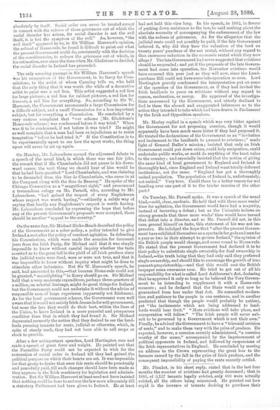On the same day, Sir Michael Hicks-Beach described the policy
of the Government as a sober policy, a policy intended to give Ireland a rest after the policy of constant agitation. In defending his Commissions, which were made the occasion for incessant jeers from the Irish Party, Sir Michael said that it was simply impossible to know without careful inquiry whether the facts asserted as to the great fall in the yield of all Irish produce since the judicial rents were fixed, were or were not true, and that it was impossible to know without inquiry what might be done to stimulate other industries. But Sir W. Harcourt's speech, he said, had amounted to this,—that because Home-rule could not be granted, " moonlighting " in Kerry should go on. Sir Michael held that a very moderate expenditure, perhaps three-quarters of a million, on arterial drainage, might do great things for Ireland, but the Government could not undertake it without the advice of responsible men of large experience (apparently not Irishmen). As for the local government scheme, the Government were well aware that it would not satisfy Irish demands for self-government, but none the less they would do their best, within the lines of the Union, to leave Ireland in a more peaceful and prosperous condition than that in which they had found it. Sir Michael deprecated earnestly the notion that they desired to see the land- lords pressing tenants for rents, judicial or otherwise, which, in spite of steady work, they had not been able to sell crops or stock to provide.


































 Previous page
Previous page